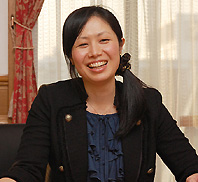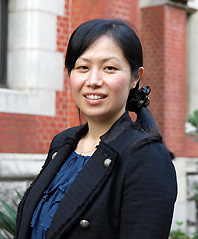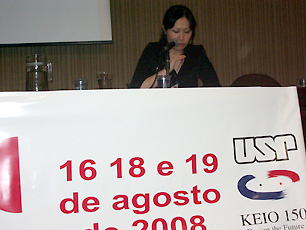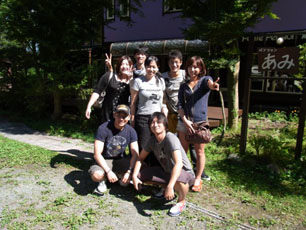Michiyo Maeda, Associate Professor, Faculty of Law
Civil and consumer law in Latin American countries as a clue to defining legal culture in Japan and Latin America
Michiyo Maeda

BA in Spanish Studies, Faculty of Foreign Studies, Tokyo University of Foreign Studies in 1997. MA in Law, Graduate School of Law, Keio University in 1999. Completed the Doctoral Course in Law, University of São Paulo (Brazil) in 2000 - 2003. Withdrawal from the Doctoral Program with the completion of course requirements, Graduate School of Law, Keio University in 2004.
Worked as a Tenured Lecturer in Faculty of Contemporary Social Studies, Doshisha Women's College of Liberal Arts, before taking up her current post in April 2007. Specializes in Latin American law. With a focus on Brazilian consumer law, conducts comparative research in Latin American, European and Japanese civil law on problems of mistake, fraud, duress and other factors affecting the validity of a contract.
From Spanish studies to research on civil law

─ For a graduate in Spanish Studies to start researching law is an extremely unusual career path, isn’t it.
I was interested in foreign cultures from senior high school days. Then I applied to enter the Faculty of Foreign Studies at Tokyo University of Foreign Studies, partly out of a wish to study abroad in future. I felt English and French to be too commonplace, and partly influenced by the Barcelona Olympics at the time, decided to major in Spanish. Studying Spanish was really great fun, but when deciding the seminar class in my Junior year, I felt it would also be important to study something other than languages. So, from a number of options including economics, politics and literature, I chose civil law. When it came to writing my graduation thesis in my Senior year, I just couldn’t decide whether to make my theme Spanish or civil law. But when I consulted the academic supervisor, he suggested I should research Spanish civil law, because then it wouldn’t matter if I approached civil law from an elementary level. Based on this advice, I made “Transfer of receivables” the theme of my graduation thesis.
─ Did the graduation thesis go well?
No, I had only studied civil law for just over a year, and so had a lot of difficulty when it came to writing the thesis. What made it worse was that, when searching for foreign data in the major law libraries in Tokyo, I could only find information on French and German law, but nothing related to Spanish law. How could this be, when there are so many more Spanish speakers in the world than French or German speakers? So then I was determined to research it myself, since I had studied both Spanish and civil law. After all, I thought, who would do it if I didn’t? (laughs)
An indispensable work of reference when writing my graduation thesis was “Transfer of Receivables”, by Masao Ikeda, Faculty of Law, Keio University. In fact, this was what led me to join Keio University for my postgraduate study on Civil Law.
─ What kind of research did you pursue at graduate school?
Partly because I wanted to delve further into the “transfer of receivables” in Spanish law, which had ended so unsatisfactorily in my undergraduate thesis, I actually went to Spain to collect data for my MA course. In class, western legal history with its focus on Italian and Roman law was very interesting. In the process, the subject of Brazilian law often came up. This was because mediaeval Roman law has had an influence on Latin American countries. On the other hand, most Latin American countries are Spanish speaking and also have connections with Spanish law, and I started to think that I would study them one day.
Consumer law more advanced in Brazil than Japan

─ How did your research develop after that?
When I started my PhD course, I had to decide where I would go to study abroad. I was not interested in going to France, as many law researchers do. Instead, I decided to challenge a new language, Portuguese, and go to Brazil to study Latin American law, which had interested me during my MA studies. Of all the universities in Latin American countries, the University of São Paulo is in the top class for law, among other fields. And of course, the classes are in Portuguese. At first I had problems with understanding the language, but partly because I had already mastered Spanish, I was able to make presentations in Portuguese after only six months.
─ Did it not feel odd for a Japanese person to be studying Brazilian law?
In Japan’s pursuit of modernization during the Meiji era, both French and German civil law were taken on board. Brazil and other Latin American countries, meanwhile, adopted French law through the medium of Spanish and other laws. In other words, both Japan and Latin American countries have French law as their basic code. Far from being odd, researching Latin American law actually helped me to gain a correct understanding of basic codes and legal principles in relation to the interpretation of law in Japan.
─ And you came across your present research theme in Brazil?
That’s right. Partly in connection with credit transfers between graduate schools, I mainly studied subjects related to civil law. One of them was consumer law. Just at that time, in 2000, the Consumer Contract Act and the Financial Instruments Sales Law were enacted in Japan. These included clauses dealing with consumers’ rights to rescind, the right to claim damages and “cooling off”. They represented a huge step forward in the field of private law for consumers, and I planned to make a presentation on the new Japanese laws in class.
However, it was a big mistake to assume that Japan, as an advanced nation, would also be advanced in its legal system. In Brazil, a consumer protection code had already been enacted in 1990, ten years before Japan introduced private law rules for consumers in 2000.
─ Why is consumer law so advanced in Brazil?
Brazilian society is considerably class-divided; the wealth of the affluent classes would be unimaginable in Japan. These classes produce people who deal with law, go to study abroad and build a high-level legal theory that could not fail, even in theory. However, there are also problems with this kind of advanced approach, in that it is far removed from social realities. For example, there are many people in the poorer classes of society who cannot even read.
Even if laws of the highest level are enacted, various problems arise when they are actually applied. These are then handled by interpreting the law, leading to major inconsistencies.
For front runners in research on Latin American law

─ What is the significance and attraction of researching Latin American law?
The creation and application of laws (for example, how ideal laws are adapted to actual societies) do not merely mean interpreting legal wording, but are deeply connected with the history and culture of a given country or region. It is only when we have a comprehensive understanding of this local culture that we can see the laws of the country concerned, and through this kind of comparative research, we can also understand Japanese law. I was interested in various foreign cultures from my senior high school days, and went on to study Spanish because I wanted to satisfy this interest. I could say that this attitude is still the same today.
─ With the ongoing globalization of today, what significance is there in researching consumer law and other foreign laws?
As economies become more global, it will be very important to know the commercial and civil law in each country where transactions are made. The economies of Brazil and other Latin American countries have achieved particularly remarkable growth in recent years, and they are having a bigger impact on the world. In future, we will need to research not only the laws of western countries but also those of BRICs and other emerging nations.
Meanwhile, deregulation of trade and the development of means of communication and transport provide increasing opportunities to buy foreign products on domestic markets. Moreover, with the deregulation of financial markets, consumer law will undoubtedly become transnational, including the perspective of investor protection and compliance management by businesses.
─ Is research on Latin American law flourishing in various universities today?
Many universities have faculties of law, but not so many provide opportunities to study foreign law. Even if there are classes on foreign law, these mainly involve British, US, French or German law, and only a handful of researchers specialize in Latin American law. Sadly, it’s still a minor subject.
At Keio University, we can learn many different languages in the Faculty of Law, including German and French as well as Spanish and Chinese. This provides a wonderful environment for pursuing research on Spanish law, Latin American law and others. Latin American law will become increasingly important in future, and studying it could be seen as an attractive field where it will be possible to open up new horizons as a front runner.
*This article appeared in "Kenkyu Saizensen" (Jan. 11, 2011) of Keio University Japanese Website.
